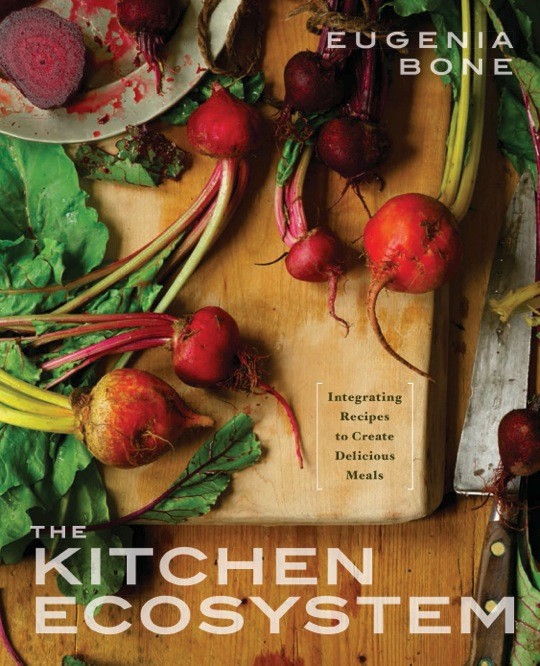
Bone will sign copies of her new book tonight at The Booksellers.
Eugenia Bone grew up around food—and we’re not talking Kraft Mac and Cheese. Her father, Edward Giobbi, is a renowned artist and cookbook author in New York who kept company with the likes of Craig Claiborne, Pierre Franey, and Jacques Pépins.
(How’s that for an intimidating potluck? I’ll bring the wine, thanks.)
Bone herself is no slouch. The author of five critically-acclaimed cookbooks, she has also appeared in The New York Times Magazine, Saveur, Food & Wine, Gourmet, and Martha Stewart Living. She says her early exposure to haute cuisine helped her develop a discerning palate and an inquenchable curiosity in the kitchen.
Not to mention, she’s goshdarn funny.
Bone’s new book is called The Kitchen Ecosystem. It’s full of recipes that play well together while making the most of what’s in the cupboard. Take carrots: no longer just for dipping in hummus! In Bone’s world, carrots appear in dishes as diverse as veal stew and pasta genovese. Heck, you can even make a delicious green pesto with the carrot tops!
Wanna see for yourself? Over the weekend, Bone has three events in Memphis:
- Book signing at The Booksellers, tonight (11/20) at 630pm
- Cooking demo at Memphis Farmers Market, Saturday (11/22) at 930am
- Special Event at The Farmer, Sunday (11/23) at 5pm
The Flyer recently caught up with Bone to talk about little white lies, beet water, and the wrong way to cook mussels.

Flyer: What was it like growing up around chefs?
Bone: Being someone who loves to eat, it was fabulous. I would get these wonderful jobs like, go and get Pierre some parsley out of the garden, or keep an eye on the fried white bait for Jacques. I was like a little kitchen maid for these guys.
Do you remember the first time you cooked something?
I do actually. I was maybe 8 years old, and we used to summer in Provincetown. And when the tide would go out, there were a bunch of rocks that had mussels growing on them. So I hatched this plan that I was gonna dig a hole and build a fire in it, and that way I was gonna cook the mussels. But I had a problem getting matches.
Surely that didn’t stop you.
(Laughs) No. What I did was, I went to the hotel on the beach. I told them my mother smoked cigarettes—which she didn’t—and that she needed matches. And it worked! So my first cooking experience was aligned with an early lie.
How did it turn out?
OK, so I got the matches, lit the fire, threw the mussels in. And it was tough, because my sister and brother kept trying to kick sand on the fire. But the mussels did eventually cook, and as I recall, they were very, very sandy. It taught me an important lesson about always washing shellfish before you cook it.
Where did you get the idea for this new book?
Many years ago, I wrote a book called At Mesa’s Edge. And my friend threw a party where she invited all these people to try making my recipes. Kind of a potluck. And the dishes were good—but secretly I was a little disappointed, because their versions weren’t as flavorful as what I was making at home. They just weren’t as punchy.
What was going on?
A couple of phone calls later, I figured it out. Whereas I was using home-made chicken stock in a recipe, they were using store-bought. Whereas I was using home-made mayonnaise, they were using Hellman’s. And that’s where I got the idea of a kitchen as an ecosystem.
An ecosystem? What do you mean?
Just like in nature, the health of any ecosystem is dependent on the health of its individual components. In the kitchen, that means your ingredients. The better each ingredient is—the more home-made, the more regional and fresh—the more delicious these recipes are going to turn out. The book is mainly about helping people make better ingredients, and doing it in a way that fits with their lives.
What is one way you can improve the health of your kitchen ecosystem today?
Look at what you buy the most often. If you frequently buy chicken broth, that means you use a lot of chicken broth. If you replace something that you frequently buy with a version that’s fresher or home-made, then your food will taste better. That’s really it.
What if I told you I don’t have time to make chicken stock?
I’d say, just make it while you’re making dinner! Turn on one more burner on the stove. Chuck some chicken bones in a pot with a little of this and a little of that—a carrot, a piece of celery. It could even be just water and half a lemon. And let it simmer while you finish cooking and eating. Done. Two pints of chicken stock.
I’ve heard you’re supposed to roast the chicken bones a second time before you use them to make stock. Supposedly it bumps up the flavor. What do you think?
Why would you make it more complicated than it has to be? I figure, no matter what you do, it’s still gonna be better than what you buy in the grocery. To me, it is more important to go ahead and do it, rather following a bunch of complicated rules that are going to keep you from ever getting started in the first place.
What’s one creative reuse for a food scrap that you’re particularly proud of?
You know when you boil beets? And the water gets all ruby-red and aromatic? So I’m staring down at this beet water, and I’m thinking, you know, this stuff has got a ton of flavor in it. So what the hell can I do with it?
Ha! Got me. What on earth do you do with beet water?
Well, first I tried it as a warm drink. And it was OK, but it was a little too health-foody for me. Then I tried it with vodka, which was really vile. But then I made granita with it. That’s like an Italian ice that you would serve after dinner. And it was delicious! And this is beet water that otherwise would have been poured down the drain.